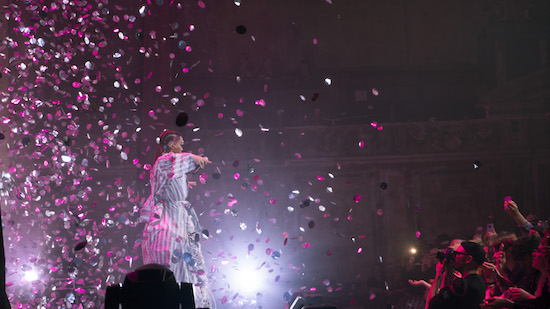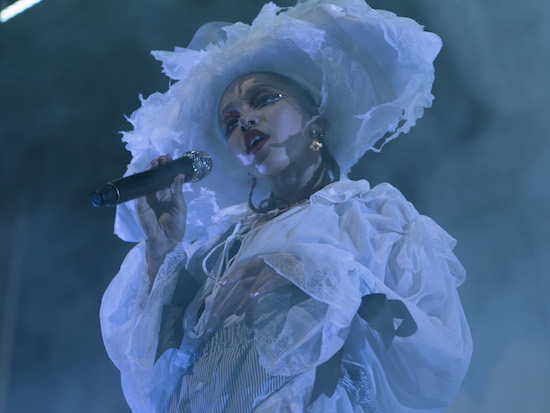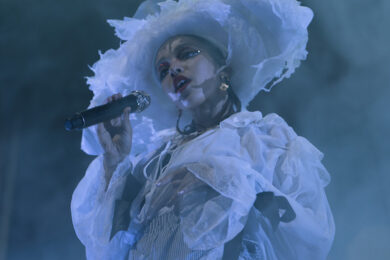All photographs courtesy of Mahaneela
The FKA twigs hiatus has felt like an eternity. During the three-year absence from releasing music, she underwent surgery to remove benign tumours from her uterus. Last May she told the BBC that the experience “knocked her confidence as a woman.” Fittingly, her entrance at Alexandra Palace is scored by synthesised vocals spouting phrases like “A Woman’s Work”, “A Woman’s Touch” and “A Secret Geometry”. Kate Bush reference or not, these words are of the utmost significance. They serve as a standfirst for her show. She’s more than merely a performer on a stage, or a singer in a studio. She’s a human defeating pain, a woman regaining power. The show is dubbed Magdalene. A fitting biblical title to a performance which abstractly parables a rise, a fall and a resurrection.
Twigs’ return to health and subsequently to performance have been well documented on her Instagram – most notably her swiftly accelerating skill as a pole dancer. For the past year, she’s been posting videos of herself on the pole, each more graceful than the last. She incorporates this flawlessly into a performance of ‘Lights On’ – a timidly sensual song that perfectly narrates the gradual acceptance of one’s own body and sexual belonging: “When I trust you, we can do it with the lights on."
However, this is merely a fragment of the dynamic showmanship that she channels into her performance. The night begins with a solitary FKA twigs, eyes covered in sunglasses, using her feet to stimulate her own rattling percussion. But the tap dancing is short lived as the curtains rise to reveal a pastoral backing not too dissimilar to one of the sets from her recent Andrew Thomas Huang-directed video ‘Cellophane’.
Each backdrop changes to another with disorientating haste. She is soon sword dancing in sync to the sound of a swift-moving blade. Moments like this – and the tap shoes – emphasise the tightly woven link between movement and sound in her artistry. Just as motion powered works like her video for ‘Water Me’, now it fuels the show here.

When the final, colourful curtain drops it reveals a scaffold with each dancer and backing band member occupying a frame of their own in the structure. The show has created a world around her and as it transitions, so does she. Twigs changes costumes four, five, six, maybe eight times during the performance. At points, it becomes a burden to keep track as each garb seems to seamlessly evolve into another, both on and off the stage. The most notable transition comes when her two female backing dancers remove an extravagant skirt from her waist, while she is hoisted in the air by their male counterparts.
While performing it feels as though she is reviving, healing, transforming to a new version of herself. Songs like ‘Video Girl’ and ‘Papi Pacify’ feel familiar but obscure, as does her rendition of her verse from ASAP Rocky’s ‘Fuck Sleep’. The set initially ends with her biggest ‘hit’ ‘Two Weeks’ but it is all too apparent that new meaning had been given to the lyric “Give me two weeks you won’t recognise her.”

The performance is indeed empowering if not without its tyranny. FKA twigs is an artist highly advanced in the science of sadness. Behind the sword-wielding and tap dancing is a pain far worse than the stab of a blade or the stamp of a foot. If it hadn’t been already, this is certainly revealed towards the end of the set when twigs makes no further attempt to withhold her tears. She finishes the show just as she started it, alone in front of a red curtain, but this time there are no tap shoes or sunglasses. She’s singing her new song ‘Cellophane’, perhaps her most gentle to date. With all the grace of Debussy and Satie, the almost nude piano exposes twigs’ voice in all its celestial beauty.
This ending doesn’t quite feel like a grandiose resurrection, or the angelic end of a fairy tale that the biblical references to Mary Magdalene may suggest. Mary, of course, witnessed Christ’s crucifixion, burial, and resurrection. Twigs herself is humble and timid in her thanks to the crowd, which silences any thoughts of that awful phrase ‘messiah complex’.



